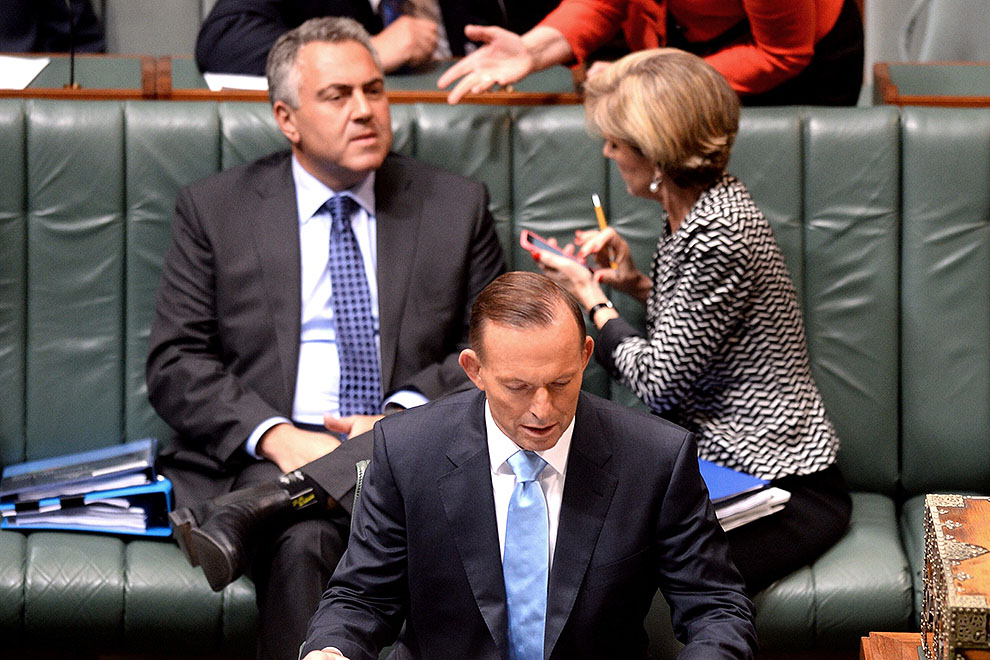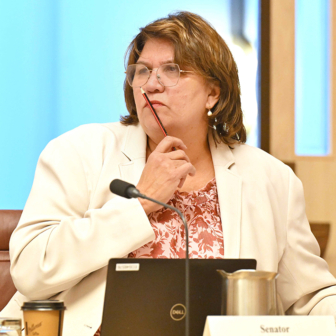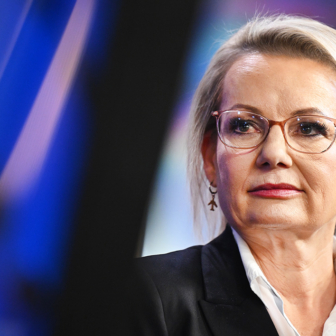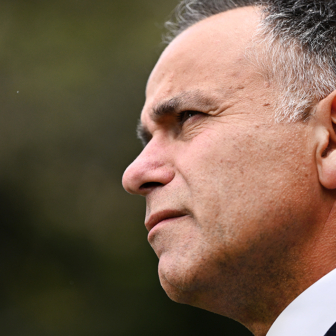Any semblance of permanence in politics, if it ever existed, is certainly hard to detect these days. No sooner do the backroom people – the engines of the contemporary political party – finish work on one campaign than they start work on the next, never mind that the election is three or four years away. The relentless media cycle and the never-ending polling ensure a permanent state of flux, and nothing and no one is safe. Policies, slogans, approaches, candidates and even leaders are in the roiling mix of uncertainty.
All this will be of concern to Tony Abbott. Prime minister he might be, and also the man who led the Liberals to victory just fifteen months ago, but that counts for little in the face of persistently dismal polls, policy flip-flops, a stalled budget, and a litany of broken promises and the reputational damage that goes with it. The hard heads in the Coalition are eyeing their thirty-seat majority with rising apprehension.
Polls, of course, rise and fall. The snapshot might mean little, but the trend line tells a different story: it is about what people are adopting as firm conviction rather than instant (and changeable) opinion. Neither the Abbott government, nor his prime ministership, enjoyed the customary honeymoon in the polls, but the optimists in the Coalition kept on reassuring all who would listen that the inevitable “bounce” was just over the next hill, once the boats had been stopped and the economy was burbling along.
Now, thirteen consecutive Newspolls on, the government continues to flatline. There are strong signals that the public has never warmed to Abbott, and for the uninspiring and robotic Bill Shorten to be ahead as preferred prime minister is nothing short of humiliating. Given that Abbott, as opposition leader, made much of Julia Gillard’s poll figures, labelling her the worst and least popular prime minister ever, what are we to make of the fact that his polling is now worse than Gillard’s ever was?
Abbott’s hold on the leadership has always been tenuous. He won it by a single vote, in a most extraordinary set of circumstances, at the end of 2009. After Joe Hockey had been eliminated, and once the fact that the alternative was Abbott had sunk in, a handful of Liberals who had voted for a leadership spill against Malcolm Turnbull hastily switched their votes back to Turnbull in the final ballot. One Liberal, now a senior minister, seemed to speak for many in the party when he said to me that the prospect of Tony Abbott as prime minister was “a very sobering thought.”
Abbott also defied the trend when he survived as leader after failing to win the 2010 election and then failing to coax the key independents to support a Coalition government in the hung parliament. Some polling pointed to Abbott himself as a key factor in the election result; certainly it was instrumental in the decision by two conservative independents to support Labor.
Abbott’s ill-judged forays into the South Australian and Victorian state election campaigns suggest he has become electoral poison, and it seems reasonable to assume that he won’t be encouraged to take part in elections coming up in New South Wales and Queensland.
Does this mean that Tony Abbott’s days are numbered? It’s difficult to give an unqualified answer here, but the best projection would be no in the short term, but decidedly more uncertain as the 2016 election year draws nearer. Perhaps the strongest thing he has going for him, and even that’s a negative, is that there is no obvious challenger breathing down his neck – or at least not at this very moment.
Cast an eye over possible successors, be they short or medium term, and a complex set of factors immediately becomes evident. The issues at stake seem very different for each of the constituencies involved – the parliamentary party, among whom backbenchers in vulnerable marginal seats are the most volatile and voluble; the extra-parliamentary organisation, which has its fingers best placed on the electoral pulse; the business and donor community, which has invested heavily in seeking advantageous policy outcomes; and, finally, the wider electorate.
Depending on whom you talk to, each of these constituencies is likely to throw up different names or even the same names but for different reasons. The people’s favourite continues to be communications minister Malcolm Turnbull, who also has significant support from business figures, especially as he has been one of them (a rarity on the Coalition front bench). But Turnbull is widely disliked within the parliamentary party as much for his abrasive personality as for what are seen as his questionable conservative credentials.
One name that crops up frequently in conversation is immigration minister Scott Morrison, who has won wide admiration among his colleagues for his steely determination against asylum-seeker boats. As a former NSW Liberal Party director, he has strong business links and some significant support there, but his grimly hardline public persona makes him an unlikely vote winner.
Victorian MPs are less admiring of Morrison and talk up the prospects of environment minister Greg Hunt, but he is seen, somewhat laughably, as a closet “greenie” by more conservative elements. Trade minister Andrew Robb has influential admirers in the business community and the wider party (he is a former federal director), but his low-key profile is seen as a handicap.
The only other two names that crop up are those of foreign minister Julie Bishop and treasurer Joe Hockey. Bishop presents something of a paradox to her colleagues. Is she policy smart or flaky? Is her prominent profile more to do with her gender and the perceived glamour of her job than with real ability? Is her position as deputy leader related to the influence of big donors in her home state of Western Australia? As for Hockey, his name comes up only to be ruled out: seemingly no one, apart from Hockey himself, sees him as a future leader.
Outside the inner circle, which is certain to be shaken up before long, only the parliamentary secretary to the prime minister, Josh Frydenberg, offers a gleam of talent for the future.
With the polls grim and the all-important budget in disarray, not to mention a growing anti-Liberal tide at state level, no one is sitting comfortably; and with the possible exception of defence minister David Johnston, no one is more uncomfortable than the prime minister. •




